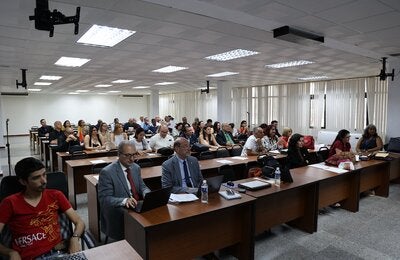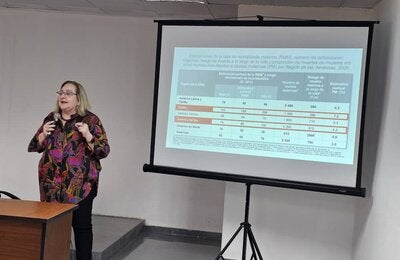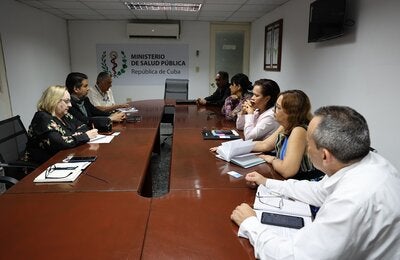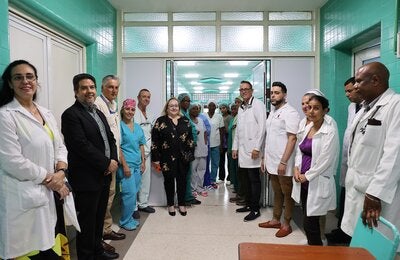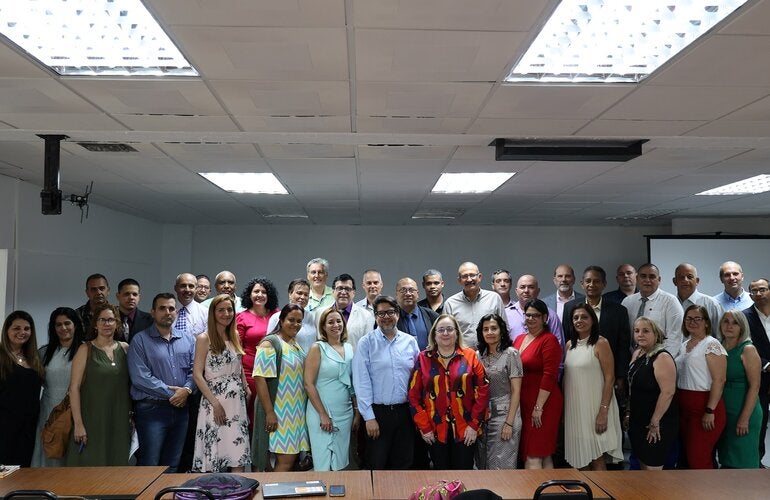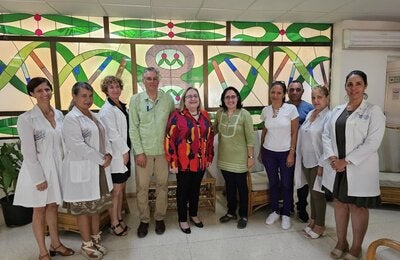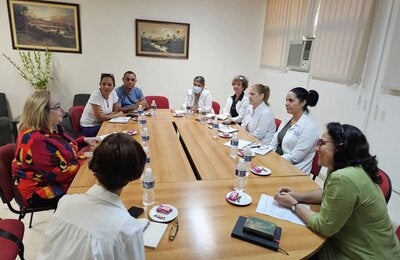
Havana, May 6, 2024 (PAHO) - A workshop on maternal morbidity and mortality, organised by the Ministry of Public Health (MINSAP) and the Latin American Centre for Perinatology, Women and Reproductive Health (CLP/WR), part of the Pan American Health Organisation (PAHO/WHO), was held in Cuba on 25-26 April.
The initiative aimed to strengthen the competencies of professionals in charge of the Maternal and Child Care Programme (PAMI), and thus increase the quality of prenatal and peripartum care, in order to contribute, in the long term, to the reduction of preventable maternal morbidity and mortality.
MINSAP authorities, PAMI coordinators from all the country's provinces, and specialists in Statistics, Medical Emergencies, Primary Health Care and Assisted Reproduction participated. From CLP/WR came a prestigious team of experts led by Dr. Suzanne Serruya, and comprising Dr. Bremen De Mucio and Dr. Claudio Sosa, who were also joined by Dr. Patricia Solís, from PAHO's Department of Evidence and Intelligence for Health Action (EIH).
The workshop was preceded by an open exchange with the main PAMI officials and a visit to the ‘Eusebio Hernández’ Maternal and Child Hospital. During the meeting with the national authorities, it was possible to learn what the National Health System (SNS) has done to reverse the effects on maternal health indicators caused by the COVID-19 pandemic and the economic difficulties the country is currently experiencing.
In this regard, it was commented that more than 20 innovations have been incorporated into the Programme and some structures have been strengthened, such as the National Committee focused on the control of maternal mortality. At the same time, the need to work on the prevention of adolescent pregnancy, which continues to be a health problem in several Cuban municipalities, was highlighted.
The tour of the hospital showed how the services for mothers and newborns are organised in these institutions, and also provided an insight into the efforts being made to promote respectful childbirth.
At the opening of the workshop, Dr. Mario Cruz Peñate, PAHO/WHO Representative, thanked for the opportunity to develop this training and highlighted the priority that Cuba gives to PAMI and the preparation of its human resources. He also noted that Dr. Jarbas Barbosa, Director of PAHO, has called for action to accelerate the reduction of maternal deaths, one of the areas in which they wish to increase the impact of collaboration.
Several topics were discussed in the working sessions. These included surveillance and response to maternal and perinatal mortality; the functioning of the Committees on Extremely Serious Maternal Morbidity; surgical emergencies in labour and delivery; embolic phenomena; and the classification of maternal deaths.
The discussion on the importance of acting promptly in the event of sepsis, which can lead to complications such as septic shock, or require operations that often involve mutilation for women, was very useful.
During the final day, participants shared their impressions of the workshop and confirmed how much they had learned by receiving high quality presentations, including examples and statistics. The space was also very useful to strengthen the links between the groups from all the provinces, and with the technical cooperation, as there was also an exchange with the United Nations Population Fund (UNFPA) team in the country, where they discussed the possibility of supporting the creation of some contraceptive simulation rooms for prioritised areas within the national territory.
Dr. Reynol Delfín García Moreiro, Vice-Minister of Public Health, was present at the closing ceremony, when he assured that the SNS will continue its efforts to reduce maternal mortality, noting that it has already managed to halt the growth curve that manifested itself in the pandemic. He also added the importance of reducing teenage pregnancy and working in accordance with the characteristics of Cuba's demographic dynamics. It is necessary to achieve a better quality of life for the elderly and to introduce measures to help the birth rate, such as increasing assisted reproduction.
For her part, the Director of CLAP/SMR, Dr. Serruya, said she had perceived the high level of commitment of all the personnel dedicated to maternal health care in the country, and highlighted some very interesting and particular efforts. In this regard, she referred to the genetic counselling that operates at all levels of care, which she learned about in a meeting she held at the National Centre for Medical Genetics (CNGM), with its Director, Dr. C. Beatriz Marcheco Teruel and a team of specialists. The exchange was also useful to discuss the re-designation of the institution as a PAHO/WHO Collaborating Centre, and to make a number of agreements that will help to further strengthen collaboration on the island.

